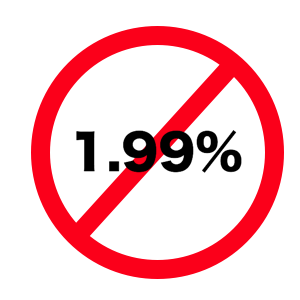For now, the days of sub-2% everyday mortgage rates are officially over. Wednesday morning’s slightly surprising 1/4-point Bank of Canada hike was the nail in that coffin.
The ensuing 1/4-point bump in prime rate will push all remaining mortgage rates above the psychologically key 2% threshold.
By next week, the lowest rates should jump roughly as follows:
- Insured variable rates: From 1.89% to 2.14%+
- Uninsured variable rates: From 2.10% to 2.35%+
- Insured 5-year fixed rates: From 2.48% to 2.58%+
- Uninsured 5-year fixed rates: From 2.70%+ to 2.80%+
If you’re trying to strategize on your mortgage given today’s hike, below are some tidbits to remember:
- Even though 1.99% rates are gone, this doesn’t mean great deals are extinct. Any mortgage of 2.79% or less is a gift from the rate deities. Why? Because at that rate, you’re generally paying more principal than interest—assuming an amortization of 25 years or less. Five-year fixed borrowers have enjoyed this edge in just five of the last 82 years (as far back as the BoC’s records go).
- Your lender will almost never offer rates similar to above if you’re converting from a variable to a fixed. Instead, you’ll likely get its crusty old “conversion rate,” which is sometimes 15 to 20+ bps higher than it gives new borrowers. (Some lenders have a one-rate-fits-all policy, but they’re the minority.) Always compare your lender’s conversion rate—plus switching costs and penalties—to the best rate you can get elsewhere. Doing this math can be lucrative.
- As usual, the lowest rate is not necessarily the best rate. Instead, you want the mortgage with the lowest overall borrowing cost. So factor in early breakage penalties, porting rules, blend-and-increase options and refinance flexibility, if they’re applicable to your situation.
- The breakeven rate between a 5-year fixed and variable is roughly 0.69%, assuming three future rate hikes. In other words, if you find a variable rate or 1- to 3-year fixed rate that’s more than 2/3 of a percentage point lower than your best 5-year fixed option, it’s worth a look. That’s assuming you’re well qualified and can tolerate rate risk. For non-rate considerations, peruse this checklist when deciding between a fixed or variable rate.
- When it comes to rates, what goes up always comes down. Economies are cyclical and last quarter’s 4.5% GDP growth won’t last. Mortgage rates are cyclical too, so you can bet your stack that they’ll consistently run below 2% again. It won’t happen this year. Maybe not next year either. But it will happen some day.

 log in
log in
 For now, the days of sub-2% everyday mortgage rates are officially over. Wednesday morning’s slightly surprising 1/4-point
For now, the days of sub-2% everyday mortgage rates are officially over. Wednesday morning’s slightly surprising 1/4-point
6 Comments
I have preapproval rates on offer with my bank from before the two recent rate hikes, and am now deciding between:
2-year fixed – 2.34
5-year fixed – 2.84
I had my heart set on the 2-year fixed, thinking there would only be a couple more hikes before things would have to come back down, and then I’d renew on a variable. But now all this excitement has me wondering if I should take advantage of the 5-year instead. What do you suggest?
Hey Sean, Can’t speak to which one’s right for you personally because that’s a long discussion. But if you model it out and focus just on the hypothetical interest cost:
* The 2-year wins if there are no more than 3 more hikes
* The 5-year wins if there are 4 or more hikes
This assumes a 25-year amortization, the rate hikes occurring in the next couple of years, no changes to the mortgages before maturity and a renewal into a prime – 0.80% variable after 24 months.
For most well-qualified risk-tolerant borrowers with financial safety nets, the 2-year is most compelling at this point.
Despite the recent rise in bond rates, HSBC only increased their 5yr variable by 25bp to 2.39, and left their 2 & 5yr fixed rates unchanged at 2.59 & 2.79.
For the people able to get a 2yr fixed for less than 2.4%, that’s a spread of less than 1% over 2yr Bank of Canada bonds. Meanwhile competitive 2yr GIC rates are closing in on 3% (2.7% at Oaken), so the big 5 will need lots of suckers buying their GICs to continue making good margins on mortgages. TD, for example, only pays 1.25% on a 2yr GIC.
Many lenders are keeping their fixed rates as is, not just HSBC. I expect this to change very shortly.
I’m still seeing some great sub-2.70% rates on your site. Can we expect these to be around for a while or will they soon start to dry up? I’m concerned because my renewal is coming up in the spring and I’m worried about renewing into a higher rate. We currently have 2.71% for our 5yr fixed.
Hi John,
The BoC would probably have to hike at least two more times for *all* sub-2.70% rates to disappear. There’s certainly a chance that could happen before you’re 90 to 120 days from closing (the longest economical rate hold periods).
Have you talked to your lender about the possibility of early renewal?